outREACH Online Conference: Q&A’s from Kim Bjørnqvist
Earlier this month we were unable to bring outREACH Conference to London due to Covid-19 restrictions, BUT, we didn’t let the pandemic hold us down! Instead we brought you outREACH Online Conference, which was even better than we could have imagined. We are so grateful to all our speakers who were able to join us for this slightly less conventional format – but it totally worked and judging by the feedback from participants, it is something we would definitely consider again for the future. If you were unable to join us for the day, you’ll be pleased to know we recorded all of the sessions, including talks from Rand Fishkin, Shannon McGuirk and Mark Johnstone. Take a look at them today!
The only problem we had was time! There wasn’t enough of it!! All of our speakers delivered rich and interesting talks, which were followed up with questions from the audience. And boy, did we get A LOT of questions. For that reason, we’ll be posting a series of follow-up blogs where our speakers have kindly taken the time to answer all the questions we were unable to get round to on 12th June, starting off with our first speaker of the day, the delightful, Kim Bjørnqvist.
Kim is the Associate Professor of Creativity and Communication at the School of Communication, Leadership and Marketing at Kristiania University College in Oslo. To say his talk set the bar high is an understatement as you can see from some of the tweets from the morning.
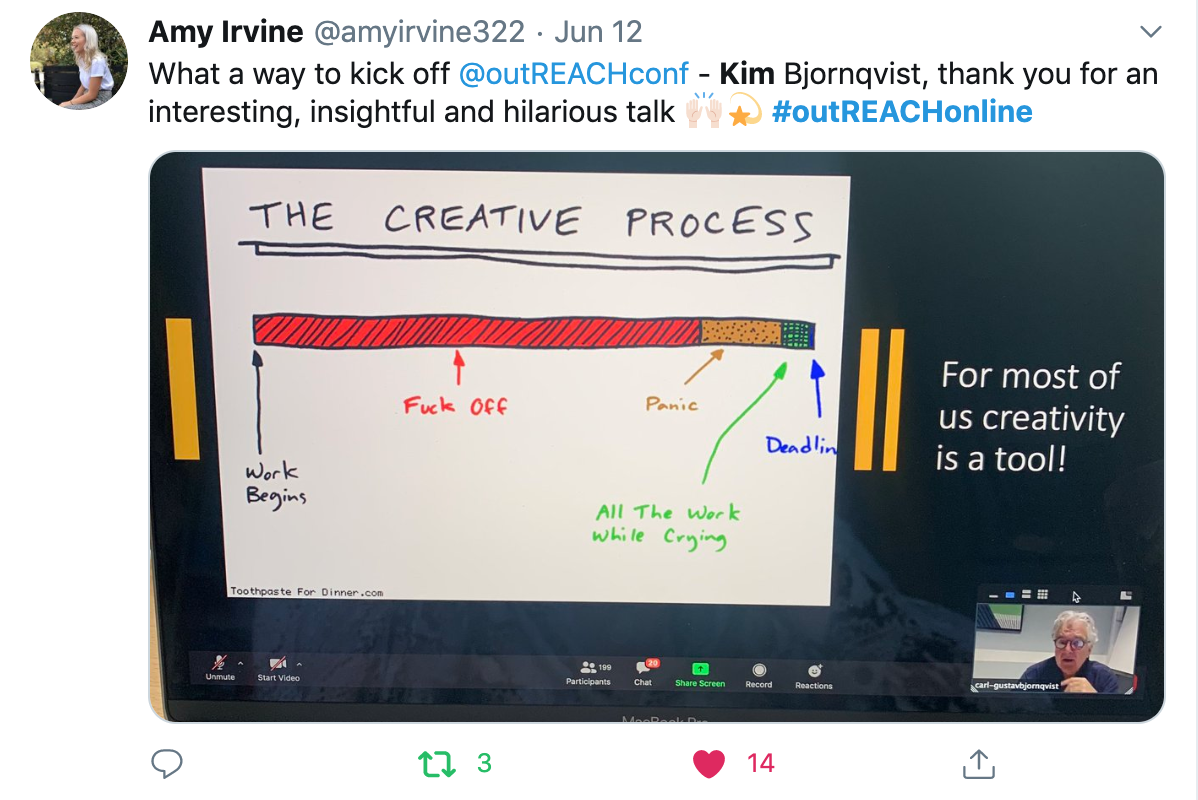

When we caught up with Kim after the conference he was keen to express his gratitude to the audience for their time, questions and kind feedback. His talk was distilled from what he would normally cover in the two day workshops he does on creativity, as well as the talks he gives on how to pitch ideas and creative writing/copywriting. It was quite the challenge for him to give a brief overview in such a short time on what is a quite complicated and fascinating subject – but he delivered nonetheless. If you are interested in finding more about this from the man himself he’d love to hear from you.
We asked Kim to answer a bunch of your questions from the conference, and here’s what he had to say…
Are there any books, podcasts, shows etc. on the creative process you would recommend?
Not as many as one would think. Unfortunately, most books about the subject of creativity fall into two categories; pretentious bullshit or self-promoting ‘look at me, how sensationally creative I am! Follow my rules, or go down the road to hell.’
Most of the books in the second category are written by advertising gurus. Good exceptions include; George Lois; Great Advice for Very Clever People and Hegarty on Creativity by John Hegarty. For the more academically inclined, there is always Mihaly Csikszentmihalyi (1990). Flow: The Psychology of Optimal Experience.
I also like Made to Stick by Chip and Dan Heath, a very hands on, refreshingly brash, typically American approach. There are some other good ones, but unfortunately they are in Norwegian.
For initial phases of pouring ideas in the bucket – do you go on until you are done or do you set a timer for adding a bit of creative pressure?
Definitely until you are done. You need a lot (100? 200?) crappy ideas to get to the really good ones. But remember to take 15 min breaks every 45 minutes. Leave the desk and take a walk, preferably outdoors.
I’m also a big fan of biometrics. Could you share any pioneers or resources on this topic?
You probably know more than me about this! My knowledge is limited to the very basic ideas. Here is an interesting link to a Norwegian company that is heavily into this.
Do you have any tips for running creativity/ideation sessions online as we have to do this a lot at the moment?
Not an easy subject – but, you need a leader/supervisor to run the process. Democracy is great in politics, not in an ideation process. Use breakout rooms as much as possible, 5 to 10 minute breakout sessions, before everyone gather together and present their stuff. The fact that zoom chooses breakout groups at random can be used to your advantage.
What do you do if you are not feeling creative?
Start creating something! Train yourself to start the process and force yourself to keep on, you will find that you quickly get into it. Like I said at the conference, creativity is a bit like sex in that respect!
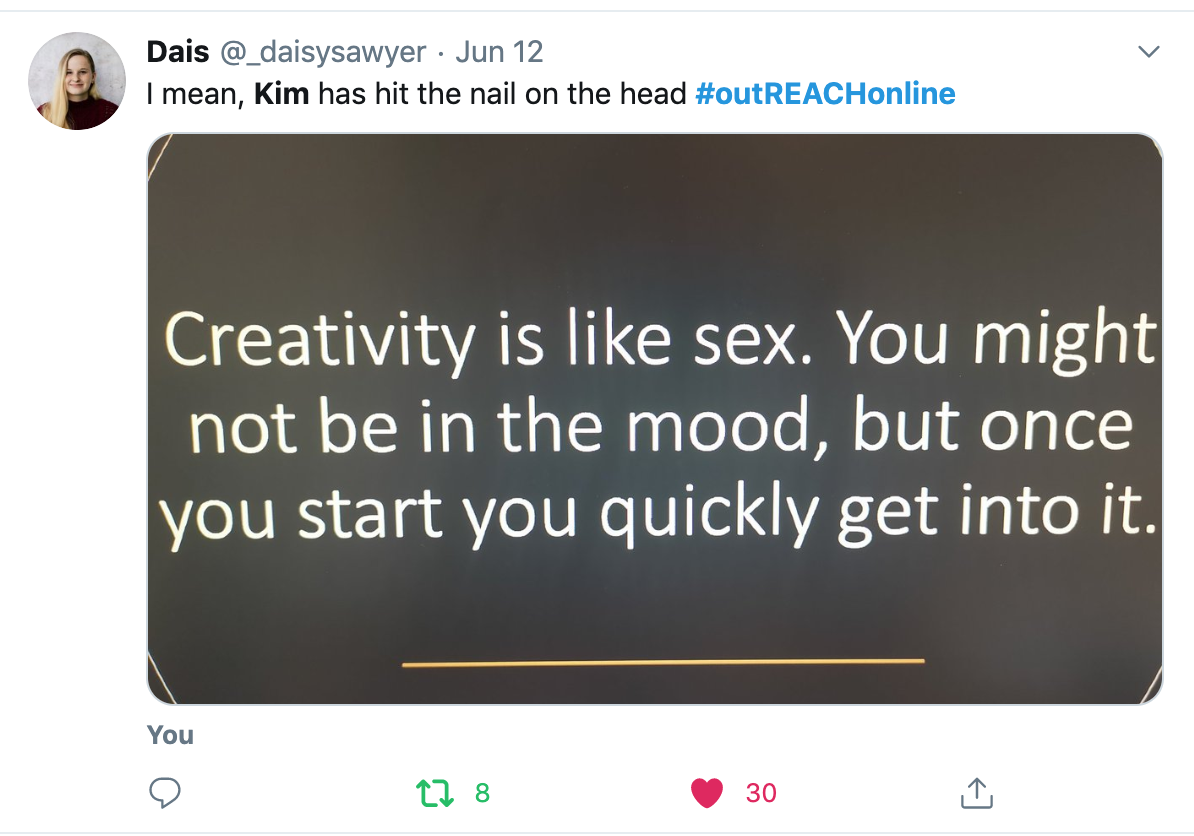
What’s your favourite creative brainstorming activity?
Well, it’s not brainstorming! (In the sense of a group of people sitting around a table, discussing.) This favours the extroverts, and it is not always the extroverts that come up with the best ideas. My favourite is the post-it method: 5 minutes intense jotting down of ideas in silence, before each in turn are put up on the wall, then grouped and finally go through the realist and critic stage.
What do you do if you know you have a decent idea, but can’t seem to get that spur of creativity to see it through or form it properly?
Polish it in a team. Working with other people often bring you the missing elements.
Who is the person or persons that has inspired you the most?
Frank Zappa, genius musician and weird/crazy person. Beethoven, for never compromising. Picasso, for his limitless creativity.
What’s the perfect number of people for a brainstorm? Is it better for more people or a handful?
My favourite number is five, if you have to be six, divide into to groups. I prefer uneven numbers, because you avoid two equal fronts stalling the process.
After some time, one may start to doubt his own creative ideas. Any advice on how to keep interest in them and not ditch them?
Never throw any ideas away. Keep an archive. Use the creative circle I gave you in my talk. Find out which segments need to be strengthened in order to get rid of the doubt.
Do you think that some people are just inherently more creative? And can you teach creativity?
Some people may have a slight advantage, due to genes, upbringing, schools etc, but creativity is like a muscle, it can definitely be trained. But you need the proper methods. Can you teach creativity? I certainly hope so, since I’ve been doing it for decades!
Do you have any tips on how to handle limitations in the creative process? Like budget, resources, time, special tone of voice etc.
Look at limitations as possibilities. In my opinion, creativity blossoms if you work within limits. Maybe not if you are an artist, but certainly in the creative industries.
Thanks again to Kim for his time during and after the conference. We’ll be bringing you more Q&A follow ups from our amazing all female panel which consisted of Carrie Rose, Gisele Navarro, Ruth Barrett and Verve Search’s very own Laura D’Amato, as well as from Mark Johnstone, Shannon McGuirk and more over the next few days.
And don’t forget you can still get tickets for outREACH London, which will now be held in November, but if you can’t wait until then, you can pick up the footage from the online conference here and find out more about what Kim means when he says creativity is like sex!
outREACH Conference 2019
A huge thank you to everyone who attended this year’s outREACH conference! It may have been drizzly outside, but we had a great day and were honoured to host amazing speakers and enthusiastic attendees.
The outREACH conference is designed to give everyone a helpful insight into the professional strategies and experiences that make up the outreach world, and we at Verve are always humbled by the open sharing of knowledge we see in the expert talks and dialogues.
Kim Bjørnqvist kicked off the day’s talks with an engaging and entertaining presentation on the power of language in the clickbait age. Kim noted that all words are symbols and can be used to build worlds for communicating with the user – who, by the way, don’t see themselves as “users”…
“People want to feel unique, not just like walking wallets.”
Kim told us about the four new Ps, highlighting again how language is the strongest tool at our disposal and needs to be used to tie a product with emotions, which can then be transferred to the user. He included insightful advertising examples (and his alterations) that showed us how important it is that people have “at least one thought in their head” when viewing an advert. As he finished, Kim left us with a rousing thought!
“Brilliant ideas are seldom logical , until afterwards.”
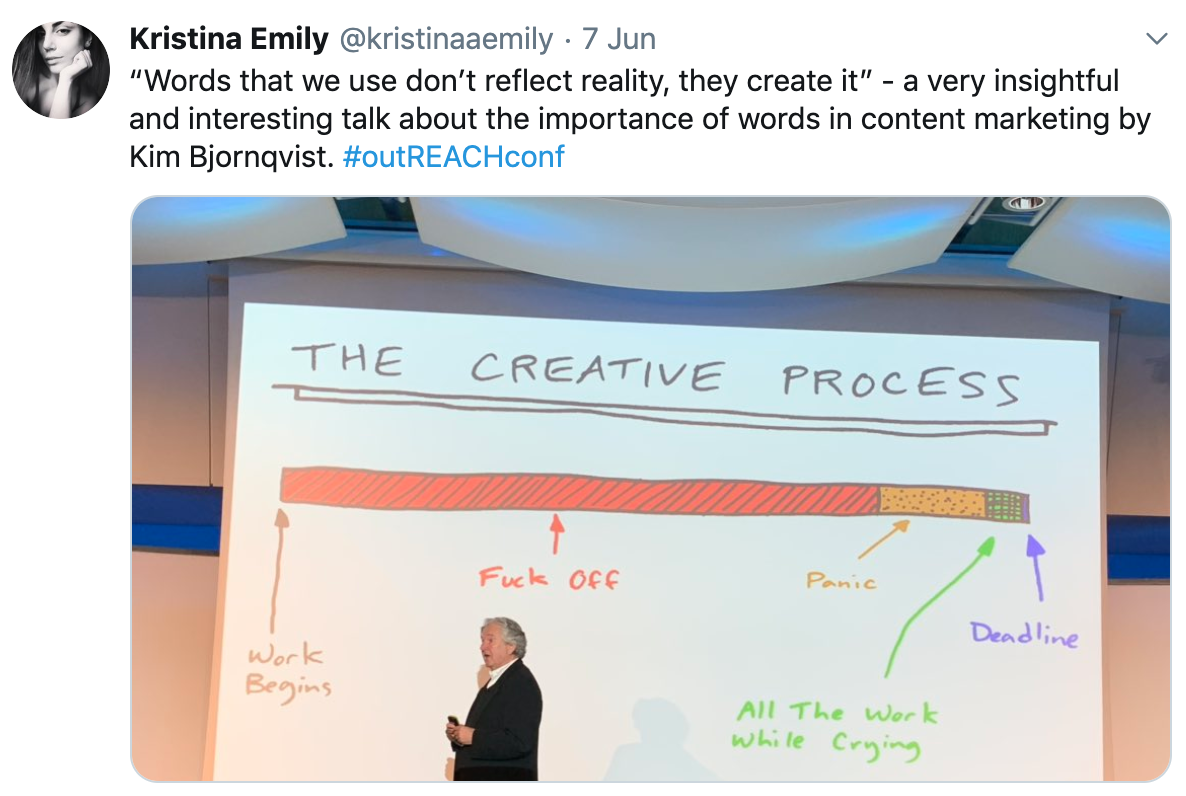
To any doubters of link-building strategies, Verve’s own Head of Innovation James Finlayson had one message: no industry is too boring, too competitive, or too regulated for creative marketing campaigns. In his energetic talk, James highlighted that consumers are looking to buy solutions to their problems rather than any specific thing.
“Build your strategy around the user, not the product.”
James used Verve showstoppers Demolishing Modernism and Unicorn League as examples of linking ‘boring’ services and software to outstanding campaigns that, crucially, achieved top-tier links. Even B2B products, which, James argued, don’t really exist – can benefit from creative campaigns marketed and outreached in the right way. The most important thing is always to create a campaign that resonates, and manage your expectations while you’re at it.
James finished by telling us about the newly launched outREACH Slack channel available to anyone interested in all things outreach. Click here to request to join.
Shannon McGuirk of Aira Digital delivered an enlightening presentation on the roles of instincts and data when outreaching a campaign. Shannon stressed that “relying on gut feelings alone is not enough”, and that outreaching based on your instincts can yield successful hits or regrettable misses.
To find a better and more consistent solution, Shannon and her team set about scraping 35,000 articles across 6 websites. They revealed the statistically optimal days for outreaching across different news categories, which sometimes lined up with instinct, and sometimes surprised everyone.

Next on the agenda was an exciting panel led by Hannah Smith, featuring Verve’s own Head of Outreach Alex Cassidy, Hana Bednarova of Bednar Communications, and Rise at Seven creative director Carrie Rose. The panellists gave us insightful tips on how to craft the perfect outreach email, as well as showing us the tools they use to contact journalists, track communications, and measure links.
An interesting question was put to the panellists: what would you tell yourself at the start of your outreach career? Alex would tell himself to “take time” and make sure to consider all angles; this may feel slow, but makes the process easier. Also, cutting data in different ways can create new angles and fresh links. Carrie advised herself (and the audience!) not to “get bogged down with metrics”, not to push too hard for a link, and to follow up on emails, showing journalists how much coverage can be gained from a fresh article. Hana highlighted the importance of building relationships with journalists and researching well.
In the afternoon, social media editor for MyLondon Sian Elvin led an insightful talk on the best ways to successfully outreach to a journalist. Her presentation was packed full of behind-the-scenes tips about best email practice, from the technical (keep to one font size!) to the practical (always read the publications you are pitching to!).
Previously a journalist at Kent Live, Sian also illustrated how important it is to tailor your outreach to local publications. Change the angle and make the data appeal to local journalists, they’ll definitely care more about your pitch.
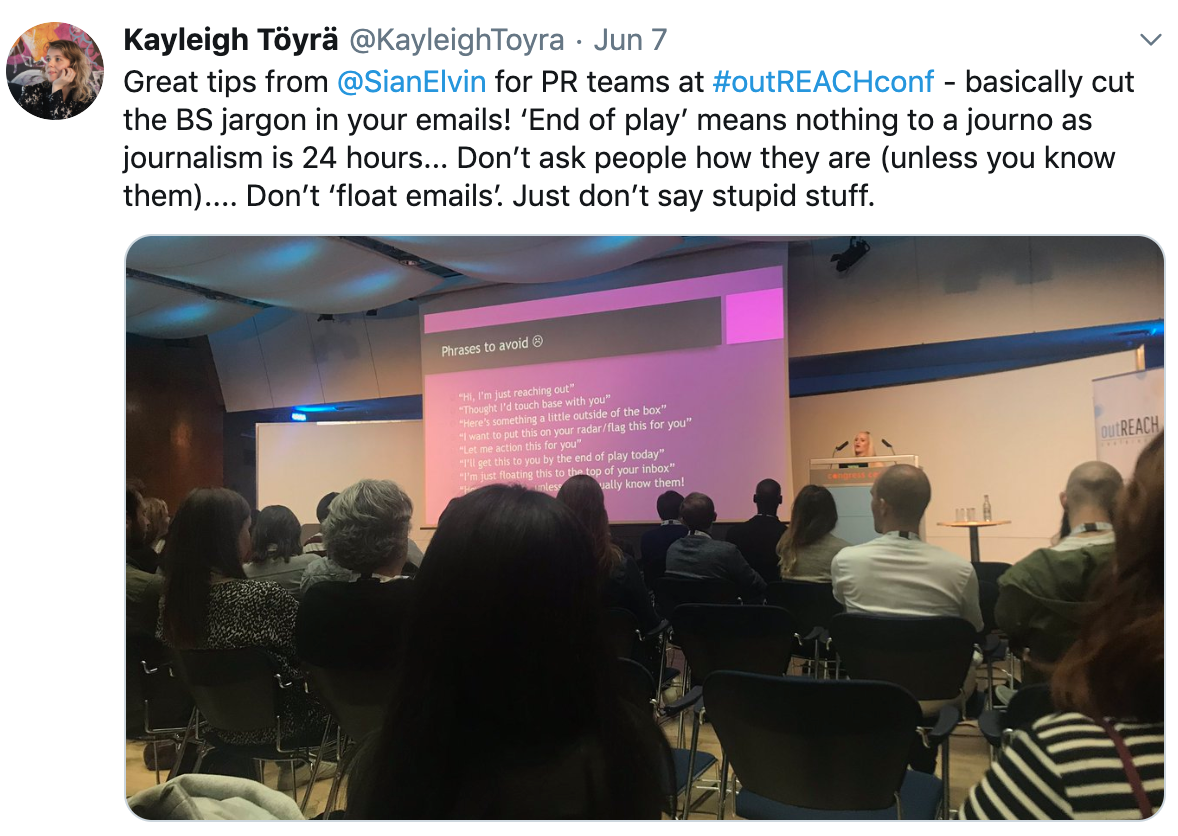
Lots of incredible advice and experiences were shared in the Q&A session that followed with Sian Elvin and freelance journalist Alistair Charlton, led by Alex Cassidy. One particular highlight was when both agreed that sending journalists all the data and assets (high quality and usable, of course) in a Dropbox link was one of the easiest ways to reduce time-wasting back and forth communication. And is it ever OK to ring up a journalist? Best not to!
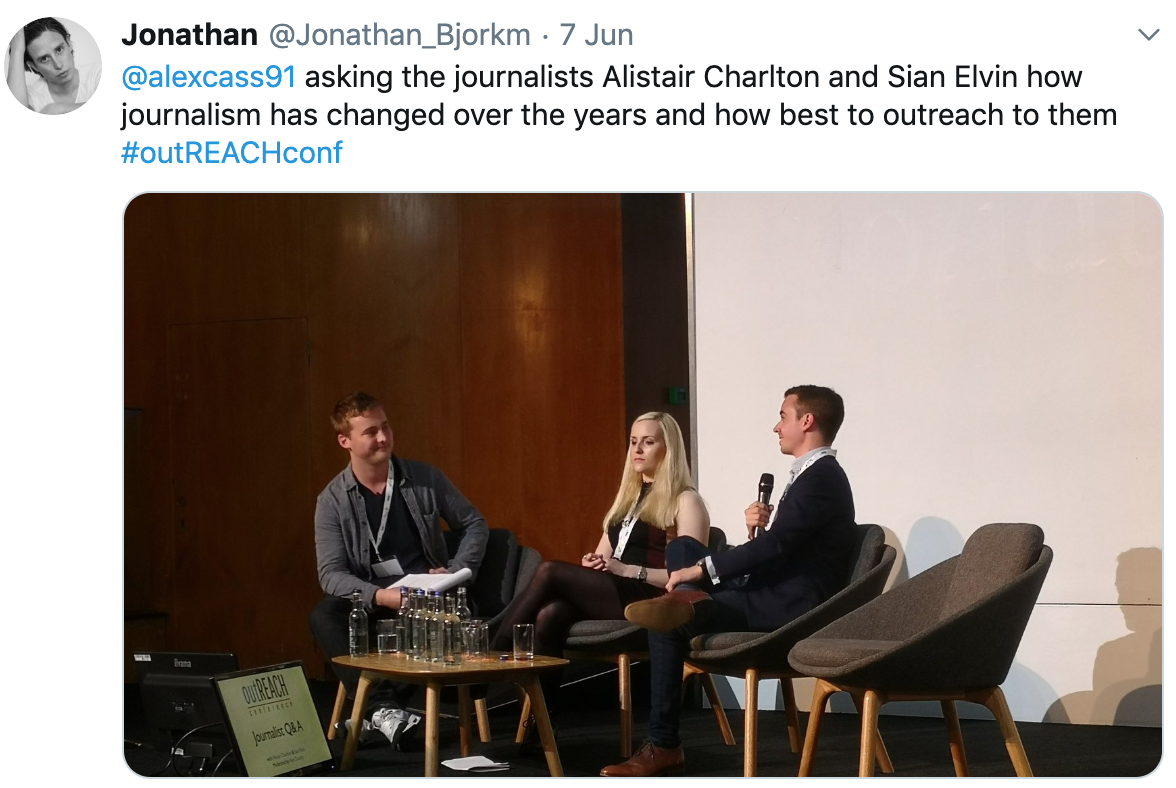
The chief growth officer at BuzzStream Stephen Panico gave a presentation on the components that make up a successful outreach campaign, and it was packed full of eureka-moment tips (when did you last deep-dive for all that archived coverage?) that got the audience thinking. Guiding us with examples of creative campaigns and link-building done well, Stephen took us through the various stages of outreach, careful to note that “not one size fits all”. For the ideation phase, we learnt about the importance of creating a campaign that resonates with current and recurring events, plus running ideas by journalists to get crucial feedback.
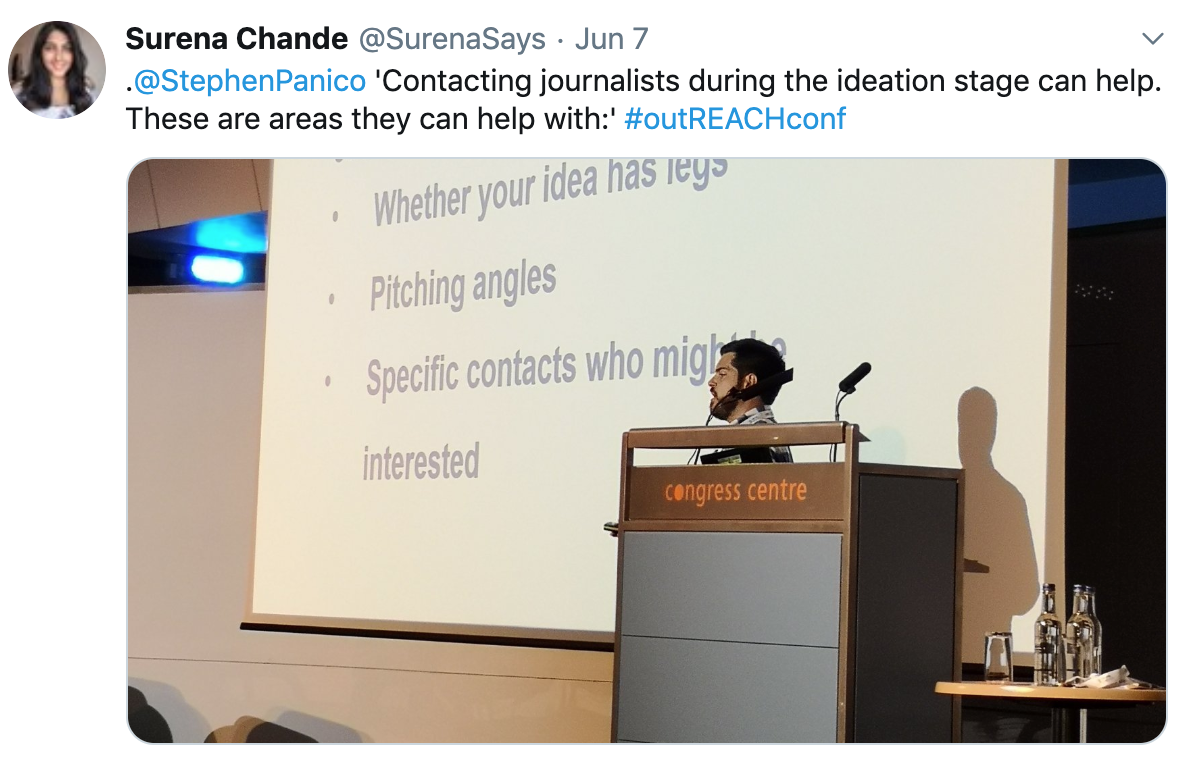
Our last talk of the day was given by keynote speaker David Rowan, author and founding editor of WIRED UK. David delivered an engaging presentation on how innovation is connected to the way people think, giving us ten ways to achieve it in and out of the workplace.
Empowering your people and allowing people to “just do their job” was one of his highlighted tips, using Supercell CEO Ilkka Paananen as an example of a leader who has a track record of putting important decisions in the hands of his employees.
David also suggested turning products into services, pointing our attention to a small bookshop in Mayfair that beat the looming online competition (looking at you, Amazon) by launching a personalised book recommendation service.
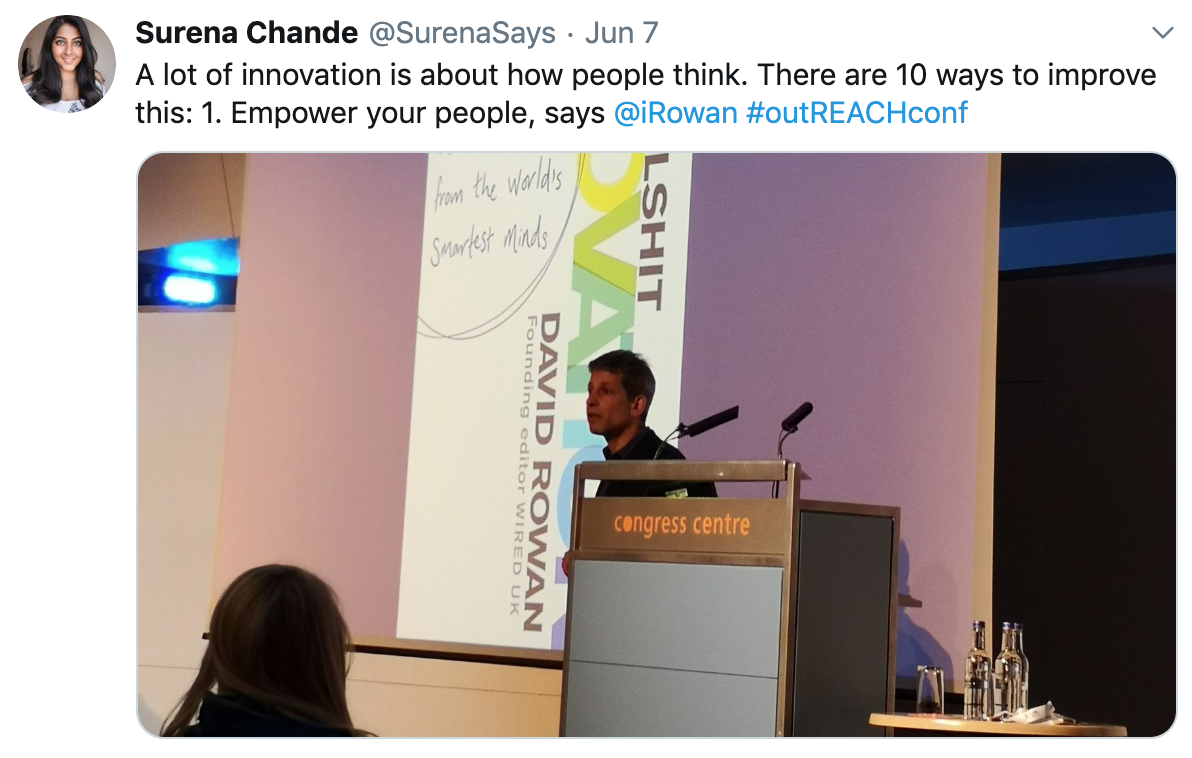
Thank you to all our speakers and attendees for another fantastic conference. We look forward to seeing you all again next year!
outREACH Conference is back for 2018

At the beginning of 2017, we decided to embark on a new challenge – run a conference!
Lisa, a seasoned conference speaker, had felt for a long time that there was an appetite in the industry for a conference 100% dedicated to outreach, and that we should run it. We booked the venue the very next day.
On June 9th 2017, over 250 attendees travelled from both within the UK and further afield (Poland, the Netherlands, Finland, Denmark, Germany, USA, Pakistan and more) to join us for the first outREACH Conference.

We were overwhelmed by the awesome tweets and positive feedback we received:

We also got some great reviews and recap posts written about the conference:
And so, we’re back with a bang in 2018, with this one day, single-track conference, 100% dedicated to outreach. With sessions on mindset, creativity, outreach strategy, plus actionable tips, advice and everything you need to succeed.
Don’t miss the opportunity to learn from the very best in the industry
Save the date: Friday June 8th at the Congress Centre, 28 Russell St, WC1B 3LS.
Want more details? You can find them right here
Confirmed Speakers
The following speakers are already confirmed:
Stacey MacNaught – SEO and Content Marketing Specialist, Tecmark

Stacey has been involved in the creation of content online since 2006. In 2009, she joined Tecmark, where she leads SEO and largely link building centric content marketing campaigns for businesses in travel, retail, professional services and finance. Stacey is also an inc.com columnist and has spoken at a number of marketing conferences globally.
Jack Murray – CEO, All Good Tales
Jack is a m edia innovator with over 20 years’ experience at the most senior level in the Irish communications industry. He has worked in marketing, journalism and media relations. He is a former political spokesperson and government advisor, as well as an award-winning corporate PR practitioner. In 2016, Jack created All Good Tales, after realising that communications was entering a golden age of storytelling, and that those with the best stories succeed.
edia innovator with over 20 years’ experience at the most senior level in the Irish communications industry. He has worked in marketing, journalism and media relations. He is a former political spokesperson and government advisor, as well as an award-winning corporate PR practitioner. In 2016, Jack created All Good Tales, after realising that communications was entering a golden age of storytelling, and that those with the best stories succeed.
Lisa Myers – CEO, Verve Search
 Lisa Myers is the CEO & Founder of Verve. Lisa has been working in SEO since 2005 and is a prolific speaker at Digital Marketing conferences worldwide.
Lisa Myers is the CEO & Founder of Verve. Lisa has been working in SEO since 2005 and is a prolific speaker at Digital Marketing conferences worldwide.
She’s a geek, a passionate entrepreneur and inspirational speaker. Often refers to herself as a modern day shield-maiden, and always finds a way of quoting Yoda.
& the full speaker line up will be announced soon…
Early bird tickets are on sale NOW
Be one of the first to secure your tickets & get £80 off the standard price when you buy before March 31st 2018. Early bird tickets are just £170.00 (+VAT) – get yours here
With thanks for our Headline Sponsor for 2018

We look forward to seeing you there!
outREACH Conference

One dreary morning in January we decided that it would be a good idea to host a conference in the summer, you know, just to challenge ourselves a little. The next day the venue was booked.
A week later we’d got the branding sorted and had put up a page on the website. Now there are just a few days to go until outREACH, our first ever conference!
We are so humbled by the positive response we’ve had from brands, other agencies and freelancers, and we would like to thank everyone who has bought a ticket to support us. We cannot wait to meet you all on Friday!
We’d also like to say a massive thank you to our sponsors – DeepCrawl, ScribbleLive/Linkdex, Majestic & SEOMonitor, for their support.
As seasoned speakers, Lisa and Hannah knew exactly what was missing from the conference scene – a single track event 100% dedicated to outreaching content. Our event follows the whole process, with sessions on coming up with creative campaigns, how to get your ideas signed off, mindset, how to (and how not to) approach journalists, processes, tools, tips, and so much more. There is no other event like it in the SEO conference calendar.
We’ve hand-picked our speakers and the entire event has been planned around their specialist knowledge. You can see a full list of speakers on our agenda page here.

Jim will show you how to tame your tigers
Closing the conference is our keynote speaker, Mr Jim Lawless, with his tales on how he used the right mindset to ‘tame his tigers’ and become a jockey…oh, and also get in the record books.
outREACH takes place this Friday, 9th June, at the Congress Centre, 28 Great Russell Street, London WC1B 3EN.
If you would like to purchase a ticket (we have less than 15 remaining), click here and enter the promo code LASTCHANCE and you will be able to secure your ticket with a 30% discount off the ticket price.
We would really love to see you there!
How to Outreach Journalists in the Age of “Churnalism”
‘Churnalism is a form of journalism in which press releases, stories provided by news agencies, and other forms of pre-packaged material, instead of reported news, are used to create articles in newspapers and other news media.’
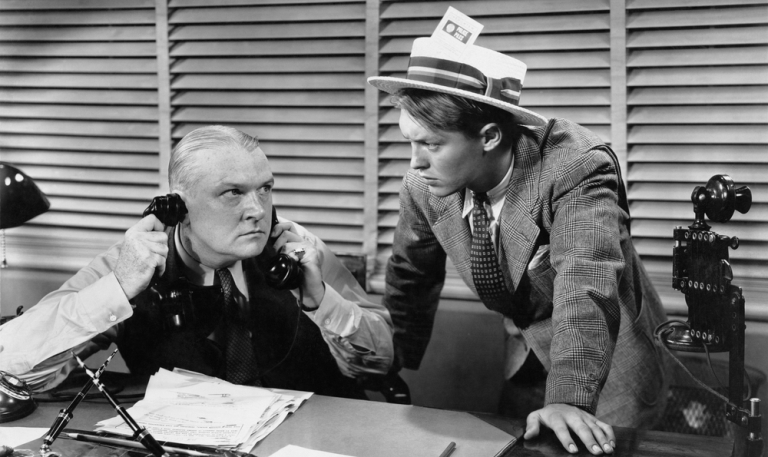 Churnalism is a reality for many editorial teams in 2017. They no longer have the luxury of spending hours writing lyrical longform tomes on a subject of their choosing. Instead they are expected to produce 5-10 pieces of highly shareable content a day that will keep readers, and advertisers, coming back to the site.
Churnalism is a reality for many editorial teams in 2017. They no longer have the luxury of spending hours writing lyrical longform tomes on a subject of their choosing. Instead they are expected to produce 5-10 pieces of highly shareable content a day that will keep readers, and advertisers, coming back to the site.
As a result journalists need to not only know what’s happening now, they also need to know what’s coming next. The pressure is on them to deliver something that stands out in the hyper-competitive wormhole of the content marketplace.
So how do we effectively deliver content to such a pressured, busy group of people? What are the myths that need dispelling and what methods can we detail to ensure that we are doing everything within our power to ensure coverage from these websites?
- Give Them Everything
There’s a time and a place for suspense, but your outreach email isn’t it. You’re not Raymond Chandler, so include everything that a journalist needs to write an article in the first email.
The highest praise, and in many ways the ultimate goal, is to make it so that the journalist can practically copy and paste what you’ve said into their CMS, hit publish and move on to their next post.
The media landscape is geared towards one key factor: speed. If you can’t get there first, at least get there early. The early bird may get the worm but the second mouse gets the cheese.
By adapting your outreach to this mind-set and not making your email a riddle, you’ve already done 90% of the journalist’s job for them, increasing your chances of gaining coverage.
- Follow Up Follow Up Follow Up!
Not wanting to sound too dramatic, but outreach can sometimes feel like you’re shouting into the void. Despite multiple subject lines, constant tinkering and casting a wide net – replies don’t always come as thick and fast as you’d like.
But don’t let the silence stall your motivation. As Roman philosopher Seneca said ‘luck is when preparation meets opportunity’. The opportunities for coverage don’t end after the first email. Put simply: follow-ups are fundamental, so make sure to keep communication up at your end.
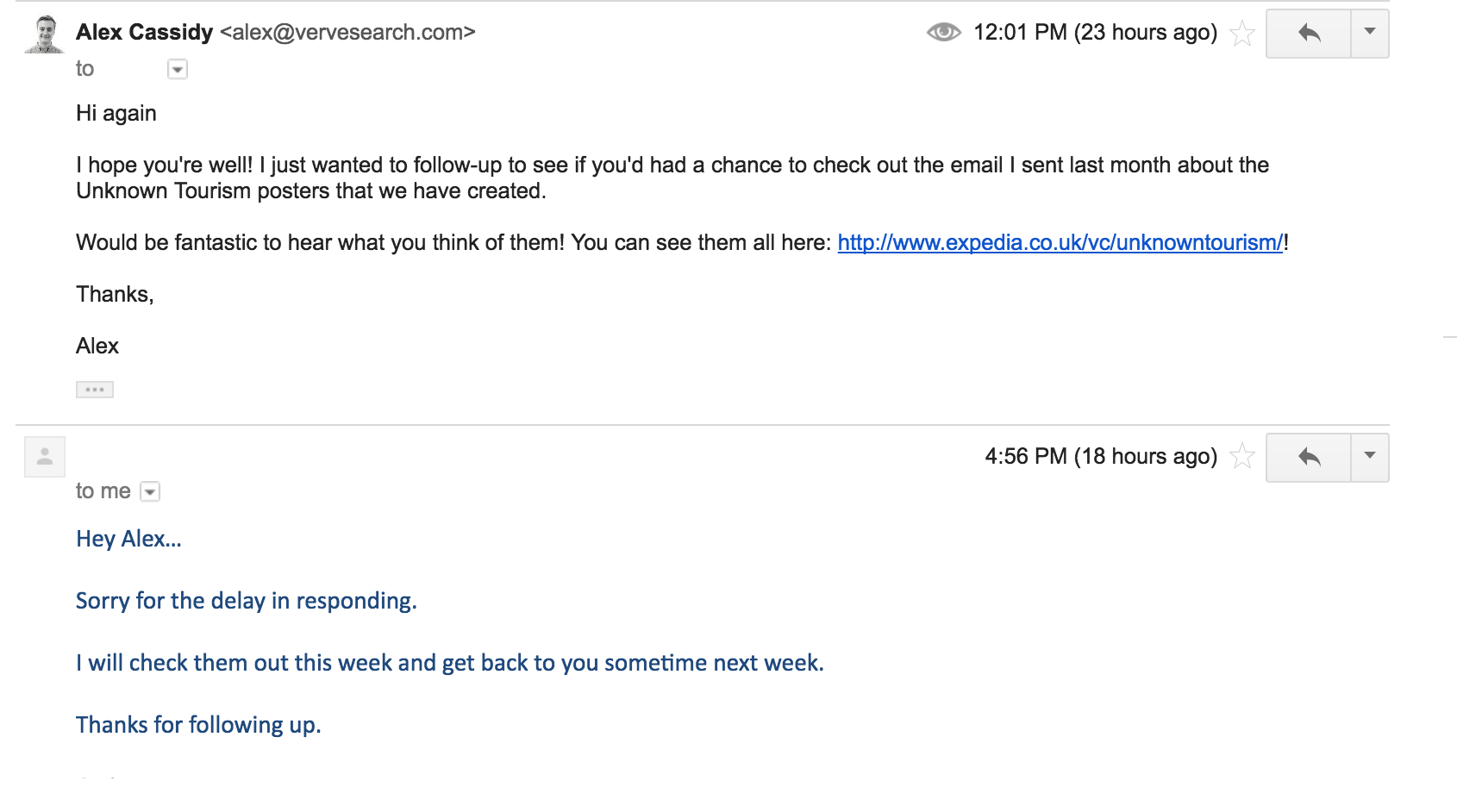 I can count over a dozen recent instances where a journalist has enthusiastically covered a campaign without ever sending me back a reply. So firstly make sure to check to see if it’s been covered before you follow-up. As a start: search for the campaign (or set up alerts), check Majestic and monitor Google analytics. You may well find out about the coverage by reading about it online.
I can count over a dozen recent instances where a journalist has enthusiastically covered a campaign without ever sending me back a reply. So firstly make sure to check to see if it’s been covered before you follow-up. As a start: search for the campaign (or set up alerts), check Majestic and monitor Google analytics. You may well find out about the coverage by reading about it online.
But when do you stop? I tend to keep it to two maximum, after all, they may well not be replying because the campaign isn’t good enough, it’s not their beat, or what you’ve written hasn’t sold it to them. But it’s important to let them make that decision themselves, and by stopping at the first hurdle, you’re making it for them.
- Multiple People Same Publication
Don’t be afraid to email the same piece of content to multiple journalists at the same publication.
Yes, it’s important to keep emails personalised, but as we have already established, journalists are very busy people, and they understand that you need to cast a wide net to get the coverage. They’re not going to take it personally, simply because they don’t have the time.
It’s not worth only sending an email to an editor in the hope they will delegate it to a writer, or just sending it to a writer in the hope they will pitch it to their editor. It’s not a two birds one stone scenario – you want to hit as many birds with as many stones and, repeatedly, when necessary.
 Ultimately it’s worth remembering that in 2017 you are not only competing with the swathes of other link-builders, outreach people and PR professionals, but also with the journalist’s time. If you respect that, and adapt to their reality instead of trying to force your own, you will have a lot more success, and potentially make some reliable contacts for the future.
Ultimately it’s worth remembering that in 2017 you are not only competing with the swathes of other link-builders, outreach people and PR professionals, but also with the journalist’s time. If you respect that, and adapt to their reality instead of trying to force your own, you will have a lot more success, and potentially make some reliable contacts for the future.
Want to know more? We are hosting our very own conference 100% dedicated to outreach! Click the outREACH Conference logo for more information.














 edia innovator with over 20 years’ experience at the most senior level in the Irish communications industry. He has worked in marketing, journalism and media relations. He is a former political spokesperson and government advisor, as well as an award-winning corporate PR practitioner. In 2016, Jack created All Good Tales, after realising that communications was entering a golden age of storytelling, and that those with the best stories succeed.
edia innovator with over 20 years’ experience at the most senior level in the Irish communications industry. He has worked in marketing, journalism and media relations. He is a former political spokesperson and government advisor, as well as an award-winning corporate PR practitioner. In 2016, Jack created All Good Tales, after realising that communications was entering a golden age of storytelling, and that those with the best stories succeed.



 Churnalism is a reality for many editorial teams in 2017. They no longer have the luxury of spending hours writing lyrical longform tomes on a subject of their choosing. Instead they are expected to produce 5-10 pieces of highly shareable content a day that will keep readers, and advertisers, coming back to the site.
Churnalism is a reality for many editorial teams in 2017. They no longer have the luxury of spending hours writing lyrical longform tomes on a subject of their choosing. Instead they are expected to produce 5-10 pieces of highly shareable content a day that will keep readers, and advertisers, coming back to the site. I can count over a dozen recent instances where a journalist has enthusiastically covered a campaign without ever sending me back a reply. So firstly make sure to check to see if it’s been covered before you follow-up. As a start: search for the campaign (or set up alerts), check Majestic and monitor Google analytics. You may well find out about the coverage by reading about it online.
I can count over a dozen recent instances where a journalist has enthusiastically covered a campaign without ever sending me back a reply. So firstly make sure to check to see if it’s been covered before you follow-up. As a start: search for the campaign (or set up alerts), check Majestic and monitor Google analytics. You may well find out about the coverage by reading about it online. Ultimately it’s worth remembering that in 2017 you are not only competing with the swathes of other link-builders, outreach people and PR professionals, but also with the journalist’s time. If you respect that, and adapt to their reality instead of trying to force your own, you will have a lot more success, and potentially make some reliable contacts for the future.
Ultimately it’s worth remembering that in 2017 you are not only competing with the swathes of other link-builders, outreach people and PR professionals, but also with the journalist’s time. If you respect that, and adapt to their reality instead of trying to force your own, you will have a lot more success, and potentially make some reliable contacts for the future.